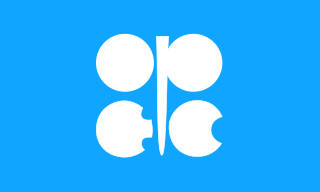
The International Union for Conservation of Nature (IUCN) is an international organization working in the field of nature conservation and sustainable use of natural resources. Founded in 1948, IUCN has become the global authority on the status of the natural world and the measures needed to safeguard it. It is involved in data gathering and analysis, research, field projects, advocacy, and education. IUCN's mission is to "influence, encourage and assist societies throughout the world to conserve nature and to ensure that any use of natural resources is equitable and ecologically sustainable".

The Organization of the Petroleum Exporting Countries is a cartel enabling the co-operation of leading oil-producing and oil-dependent countries in order to collectively influence the global oil market and maximize profit. It was founded on 14 September 1960, in Baghdad by the first five members which are Iran, Iraq, Kuwait, Saudi Arabia, and Venezuela. The organization, which currently comprises 12 member countries, accounted for 38 percent of global oil production, according to a 2022 report. Additionally, it is estimated that 79.5 percent of the world's proven oil reserves are located within OPEC nations, with the Middle East alone accounting for 67.2 percent of OPEC's total reserves.

The Major League Baseball All-Star Game, also known as the "Midsummer Classic", is an annual professional baseball game sanctioned by Major League Baseball (MLB) and contested between the all-stars from the American League (AL) and National League (NL). Starting fielders are selected by fans, pitchers are selected by managers, and reserves are selected by players and managers.

The World Peace Council (WPC) is an international organization created in 1949 by the Cominform and propped up by the Soviet Union. Throughout the Cold War, WPC engaged in propaganda efforts on behalf of the Soviet Union, whereby it criticized the United States and its allies while defending the Soviet Union's involvement in numerous conflicts.
The Union for International Cancer Control or UICC is a non-governmental organisation with over 1,150 member organisations in more than 170 countries and territories.

The New Zealand women's rugby union team, called the Black Ferns, represents New Zealand in women's international rugby union, which is regarded as the country's national sport. The team has won six out of nine Women's Rugby World Cup tournaments.

The International Council of Design is an international organisation representing the professions of design. The Council was founded in London in 1963 and celebrated its 50th anniversary on 27 April 2013. It is a non-profit, non-partisan, "member-based network of independent organisations and stakeholders working within the multidisciplinary scope of design."

QatarEnergy, formerly Qatar Petroleum (QP), is a state owned petroleum company of Qatar. The company operates all oil and gas activities in Qatar, including exploration, production, refining, transport, and storage. The President & CEO is Saad Sherida al-Kaabi, Minister of State for Energy Affairs. The company's operations are directly linked with state planning agencies, regulatory authorities, and policy making bodies. Together, revenues from oil and natural gas amount to 60% of the country's GDP. As of 2018 it was the third largest oil company in the world by oil and gas reserves. In 2022, the company had total revenues of US$52bn, a net income of US42.4bn, and total assets of US$162bn. In 2021, QatarEnergy was the fifth largest gas company in the world.

The World Energy Council is a global forum for thought-leadership and tangible engagement with headquarters in London. Its mission is 'To promote the sustainable supply and use of energy for the greatest benefit of all people'.

The International Handball Federation (IHF) is the administrative and controlling body for handball and beach handball. IHF is responsible for the organisation of handball's major international tournaments, notably the IHF World Men's Handball Championship, which commenced in 1938, and the IHF World Women's Handball Championship, which commenced in 1957.

Abdul Hadi bin Awang is a Malaysian politician and religious teacher who has served as Member of Parliament (MP) for Marang since October 1990, 7th President of the Malaysian Islamic Party (PAS), an Islamist political party since July 2002 and a component party of Perikatan Nasional (PN) coalition and formerly Gagasan Sejahtera (GS), Pakatan Rakyat (PR), Barisan Alternatif (BA) and Angkatan Perpaduan Ummah (APU) coalitions. He served as the Leader of the Opposition from September 2002 to March 2004, 11th Menteri Besar of Terengganu from December 1999 to March 2004 and Member of the Terengganu State Legislative Assembly (MLA) for Ru Rendang from 1986 until 2018. At the international level, he formerly served as Vice-President of the International Union of Muslim Scholars.

Archie Wallace Dunham served as president and chief executive officer of Conoco Inc. from January 1996 to August 2002, then as chairman of ConocoPhillips, following the merger of Conoco Inc. and Phillips Petroleum Company, until his retirement on September 30, 2004. Dunham was chairman of Chesapeake Energy from 2012 to 2015 and chairman emeritus from 2015 to 2019.

Clement Willis Bowman was a Canadian chemical engineer, the founding chairperson of the Alberta Oil Sands Technology and Research Authority. He was a Member of the Order of Canada and a recipient of the Global Energy Prize.

Khalid A. Al-Falih is Minister of Investment of Saudi Arabia since 25 February 2020. He served as Minister of Energy of Saudi Arabia and chairman of Saudi Aramco. He also has previously served as the Saudi Arabian Health Minister and Aramco's CEO.
During the Cold War (1947–1991), when the Soviet Union and the United States were engaged in an arms race, the Soviet Union promoted its foreign policy through the World Peace Council and other front organizations. Some writers have claimed that it also influenced non-aligned peace groups in the West.
WREN is a major non-profit organization registered in the United Kingdom with charitable status and affiliated to UNESCO, the Deputy Director General of which is its honorary President. It has a Governing Council, an Executive Committee and a Director General. It maintains links with many United Nations, governmental and non-governmental organisations.

{{Under construction}}
The World Green Building Council (WorldGBC) is a non-profit organisation and global network of national Green Building Councils (GBCs). It has member councils in over 70 countries worldwide, which collectively have 49,000 members.

Mohammed Sanusi Barkindo was a Nigerian politician. From 1 August 2016 until his death, he was the secretary general of the Organization of the Petroleum Exporting Countries. He helped to create the OPEC+ alliance between OPEC members and other oil-producing countries.
Petroleum refining in the United Kingdom produced around 51.45 million tonnes of petroleum products in 2023, down 16% from 2015 and 32% from 2011. There are six major and one minor petroleum refinery in the downstream sector of the UK oil industry.















